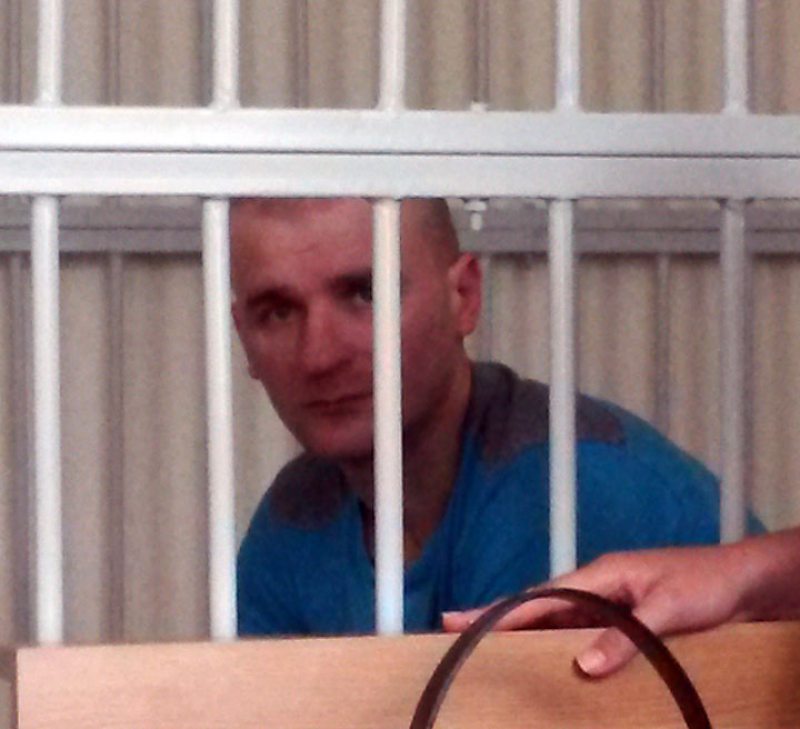Death Sentence Upheld in Appeal in Supreme Court
On 17 March 2017, 32-year-old Aliaksei Mikhalenya was sentenced to death by the Homel Regional Court of Belarus for two murders, committed with particular cruelty (p. 1, p. 6, p. 16 part 2 of art. 139 of the Criminal Code). The man had been previously convicted twice for theft and once for murder when being underage.
The appeal was heard on June 30 by the Panel on Criminal Cases of the Supreme Court, chaired by Judge Ruslan Aniskevich.
The convict was held handcuffed in a metallic cage, guarded by five police officers.
Having gone through with procedural questions and consulted the parties concerned, the court forbid photo and video recording, allowing only audio recording.
A lawyer Tatsiana Padretskaya motioned to attach several positive characteristics of the convict to the case materials, as well as some requests to establishments related to investigative activities, which had stayed unanswered so far. The lawyer explained that in the initial hearing, some procedural mistakes were made, proofs of the crime were obtained after the detention of the convict, there were inaccuracies in forensic and psychiatric examinations which, in lawyer’s opinion, were incomplete and missing some important factors. The lawyer disputed the court’s view that the fact of alcohol intoxication was an aggravating circumstance – the lawyer thinks it has not been proved in court.
The lawyer additionally underlined that at first questionings, Mikhalenia’s right to defense was violated – the duty lawyer was provided only two hours upon two hours of questioning.
The lawyer appealed to overturn the decision of the first instance court and to review the case in order to look into all inaccuracies and circumstances in details.
“The number of procedural violations is so big that it is impossible to look into all the details in appeal,” remarked the lawyer.
The second lawyer also appealed to mitigate the sentence, stressing on the psychic disease of her defendant, namely a slight mental deficiency.
After a break, the court upheld the motions despite prosecution’s protests, and the materials were attached to the case.
“Aliaksaei Mikhalenia was born in Yelsk district in 1984, he has a basic secondary education, unemployed,” read out the judge the case materials. “Three times convicted, including one murder. After the last release on February 27, 2016, he got back to his parents’ house. On March 4, based on hostile relations with the victim, started a fighting in the house of the murdered Fatseyeu. According to the investigation materials, he inflicted over 20 traumatic beats on the host of the house, hitting with fists, a wooden stick and finally with a knife. The same way he murdered the host’s sister. Meanwhile, the convict was aware of the particular cruelty of his actions.”
Mikhalenia was detained the next day, on March 5. He pleaded guilty the same day and filed full confession.
Mikhalenia’s version of the tragedy is slightly different: he said these had been the hosts of the house who started the fighting, where Mikhalenia had come at his father’s request; he started to defend and finally stopped realizing what he was doing. He does not remember many things.
By the way, the materials of forensic examination registered numerous harms on the murderers body: broken face and nose, bruises on the back. The circumstance was ignored by the first instance court, and the forensic expert was not questioned in the process.
Mikhalenia cast doubts on the medical conclusion on his drunken state, stating that he had taken the test on alcohol twice with several hours interval, but the first, a neutral conclusion was absent from the case materials.
In the final speech, Mikhalenia said that he repented of the committed crime, begged pardon from the aggrieved parties, and stated he would give life to return the lives of the murdered. He asked to take into account that he had had no hostile relations with the murdered, and then he gave a long and detailed account of the tragic day, until judges started interrupting with questions.
Mikhalenia said that he had filed full confession and willingly cooperated with the investigation, which was a mitigating circumstances ignored by the first instance court.
“I feel repulsive, ashamed and scared. Allow me to live at least locked up,” said finally the convict.
The state prosecutor claimed that the lawyers’ motions were ungrounded; the convict’s guilt had been proved fully. Mikhalenia had had the intention to kill and had been fully responsible for his actions.
After a break, the chair of the judges’ panel Ruslan Aniskevich read out the court ruling: to uphold the decision of the first instance court. Then the judge briefly explained that the convict had the right to plead for presidential pardon within 10 days after receiving the court ruling.
According to information of human rights defenders, only one person is awaiting execution in Minsk detention facility No1 – this is Kiryl Kazachok, a resident of Mazyr, who refused to appeal against the death sentence.
Since the start of 2017, one death sentence has been executed: Siarhei Vostrykau, a resident of Homel, had his appeal dismissed and shot down in late April.
Belarus stays the only European country applying death sentences. Since 1990, over 400 have been sentenced to capital punishment, and only one person had this sentence mitigated to imprisonment.


